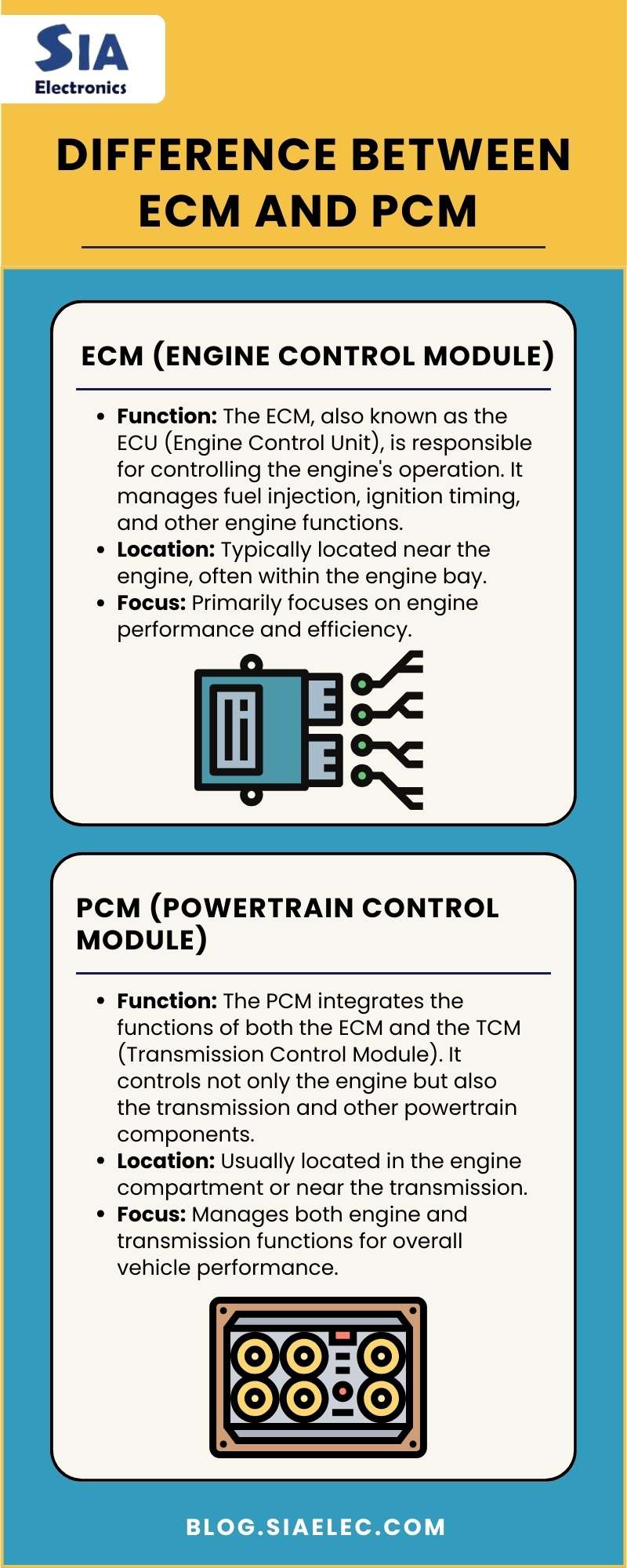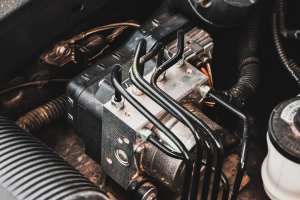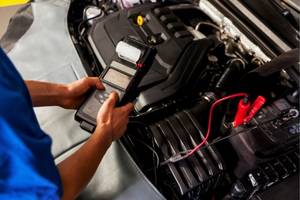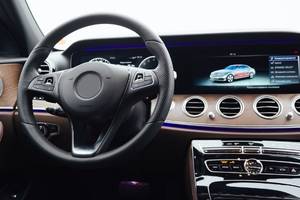Table of Contents
Introduction
When it comes to modern vehicles, the terms ECM and PCM frequently come up. Both are critical components of a vehicle's electronic system, but they serve distinct functions. Understanding the difference between ECM and PCM is crucial for diagnosing problems and ensuring optimal vehicle performance. In this guide, we'll dive into what sets these two modules apart, their impact on vehicle performance, diagnostic methods, replacement costs, and their longevity.
What is the Difference Between ECM and PCM in a Car?
ECM (Engine Control Module)
Function: The ECM, also known as the ECU (Engine Control Unit), is responsible for controlling the engine's operation. It manages fuel injection, ignition timing, and other engine functions.
Location: Typically located near the engine, often within the engine bay.
Focus: Primarily focuses on engine performance and efficiency.
PCM (Powertrain Control Module)
Function: The PCM integrates the functions of both the ECM and the TCM (Transmission Control Module). It controls not only the engine but also the transmission and other powertrain components.
Location: Usually located in the engine compartment or near the transmission.
Focus: Manages both engine and transmission functions for overall vehicle performance.
Key Differences
- Scope: ECM focuses solely on engine management, while PCM covers both engine and transmission control.
- Complexity: PCM is more complex due to its broader scope, combining the functionalities of ECM and TCM.
How Do ECM and PCM Affect Vehicle Performance?
ECM Impact
- Engine Efficiency: Optimizes fuel injection and ignition timing, improving fuel efficiency and engine performance.
- Emissions Control: Manages exhaust emissions by adjusting engine parameters to meet regulatory standards.
PCM Impact
- Powertrain Integration: Coordinates engine and transmission functions, ensuring smooth gear shifts and optimal power delivery.
- Performance Tuning: Adjusts both engine and transmission settings based on driving conditions, enhancing overall driving experience.
Combined Effects
Synergy: The PCM's ability to manage both engine and transmission ensures that performance, fuel efficiency, and drivability are balanced.
How Do You Diagnose Issues with the ECM and PCM?
Diagnosing ECM Issues
- Symptoms: Poor engine performance, check engine light activation, and irregular fuel consumption.
- Tools: Use an OBD-II scanner to read diagnostic trouble codes (DTCs) related to engine control.
Diagnosing PCM Issues
- Symptoms: Transmission problems, erratic shifting, and engine performance issues.
- Tools: An OBD-II scanner is also used, but with a focus on both engine and transmission-related codes.
Common Diagnostic Steps
- Read Error Codes: Identify trouble codes related to ECM or PCM.
- Visual Inspection: Check for loose connections or damaged wiring.
- Perform Tests: Use diagnostic tools to test specific functions controlled by the ECM or PCM.
What Are the Costs of Replacing an ECM vs. a PCM?
ECM Replacement Costs
Average Cost: Replacing an ECM can range from $800 to $2,000, including parts and labor.
Factors: Costs vary based on vehicle make, model, and whether a new or remanufactured unit is used.
PCM Replacement Costs
Average Cost: Replacing a PCM typically ranges from $1,000 to $2,500, including parts and labor.
Factors: Higher cost due to the PCM's integrated control of both engine and transmission systems.
Cost Comparison
- ECM: Generally less expensive than a PCM due to its more focused functionality.
- PCM: More costly but offers broader control over vehicle systems.
How Long Do ECMs and PCMs Typically Last?
ECM Longevity
Typical Lifespan: ECMs generally last between 100,000 to 150,000 miles.
Factors Influencing Lifespan: Environmental conditions, driving habits, and maintenance practices.
PCM Longevity
Typical Lifespan: PCMs usually last around 150,000 miles or more.
Factors Influencing Lifespan: Similar factors as ECMs, with additional wear from transmission control.
Longevity Comparison
- ECM: Slightly shorter lifespan compared to PCM, primarily due to its specialized role.
- PCM: Longer lifespan due to its comprehensive control over multiple systems.
Conclusion
Understanding the difference between ECM and PCM is vital for effective vehicle maintenance and repair. While both modules play crucial roles in vehicle performance, they each have distinct functions. The ECM focuses on engine management, while the PCM integrates engine and transmission control. Diagnosing issues, understanding replacement costs, and knowing their typical lifespans are essential for maintaining optimal vehicle operation. By staying informed about these components, you can make better decisions for your vehicle's health and performance.
FAQs on
Difference Between ECM and PCM : A Comprehensive Guide
-
1. What are the primary functions of the ECM and PCM in a vehicle?
Ans.
The ECM (Engine Control Module) primarily controls engine functions such as fuel injection and ignition timing. The PCM (Powertrain Control Module) manages both the engine and transmission, integrating their functions for overall vehicle performance.
-
2. How can I tell if there's an issue with my vehicle's ECM or PCM?
Ans.
Issues with the ECM might manifest as poor engine performance, irregular fuel consumption, or a check engine light. PCM problems can lead to transmission issues, erratic shifting, or combined engine and transmission performance problems. Diagnostic trouble codes (DTCs) from an OBD-II scanner can help identify the specific issues.
-
3. What factors contribute to the cost difference between replacing an ECM and a PCM?
Ans.
ECM replacement generally costs between $800 and $2,000, while PCM replacement ranges from $1,000 to $2,500. The higher cost of the PCM is due to its integrated control over both engine and transmission systems, making it a more complex and expensive component.
-
4. How long can I expect my ECM or PCM to last?
Ans.
ECMs typically last between 100,000 to 150,000 miles, while PCMs usually last around 150,000 miles or more. Longevity can be affected by environmental conditions, driving habits, and maintenance practices.
-
5. What diagnostic tools are recommended for troubleshooting ECM and PCM issues?
Ans.
An OBD-II scanner is essential for reading diagnostic trouble codes (DTCs) for both ECM and PCM issues. For ECM problems, the focus is on engine-related codes, while PCM diagnostics will involve codes related to both engine and transmission.
-
6. Are there any signs that an ECM or PCM might need replacement?
Ans.
Signs of a failing ECM include poor engine performance, trouble starting the vehicle, or irregular fuel consumption. PCM issues might show up as transmission problems, erratic gear shifting, or combined engine and transmission performance issues. Regular diagnostics and maintenance can help detect these problems early.



